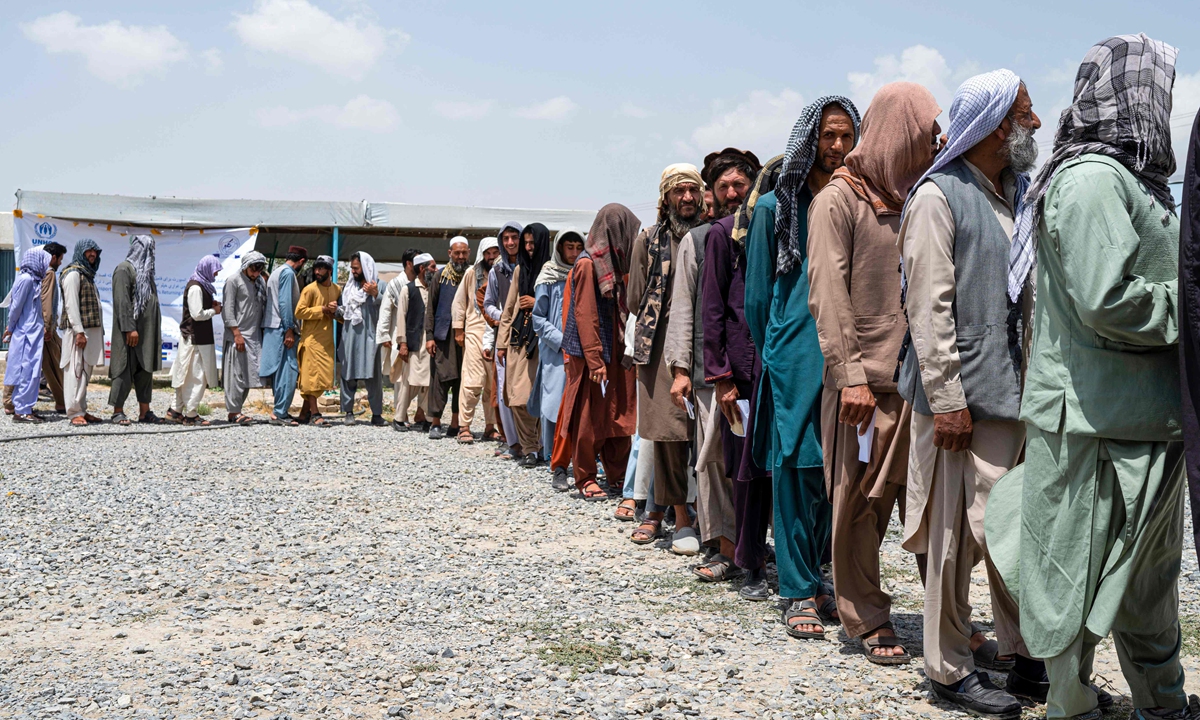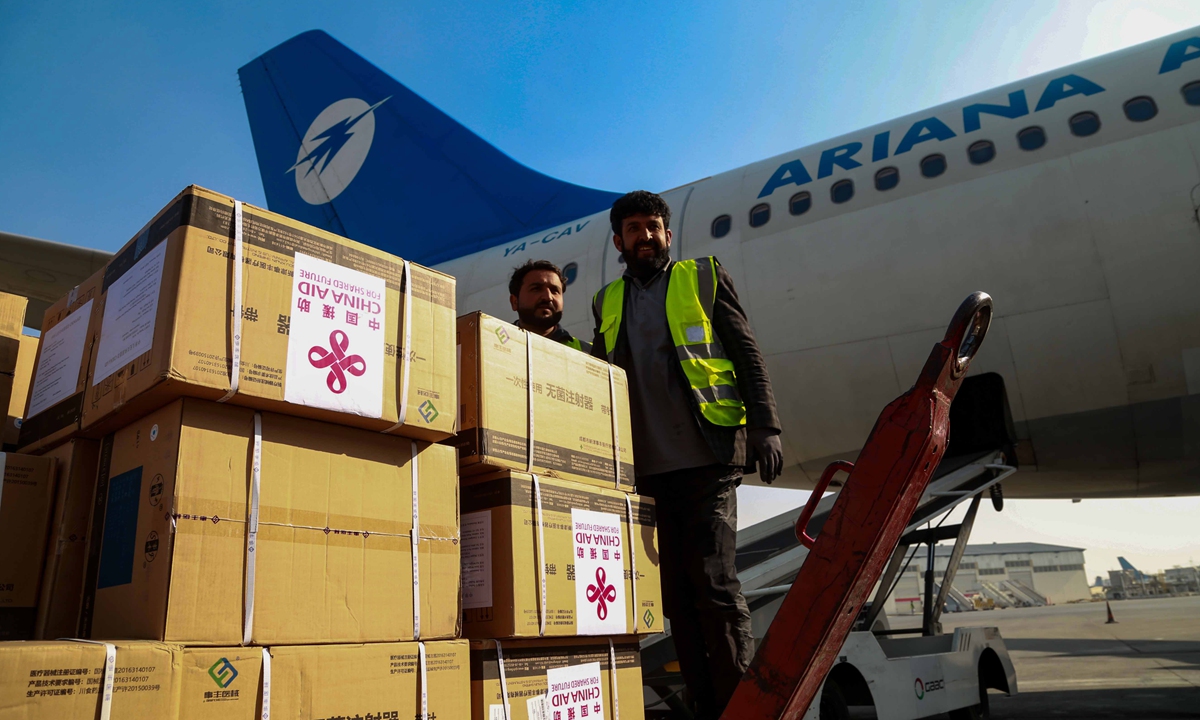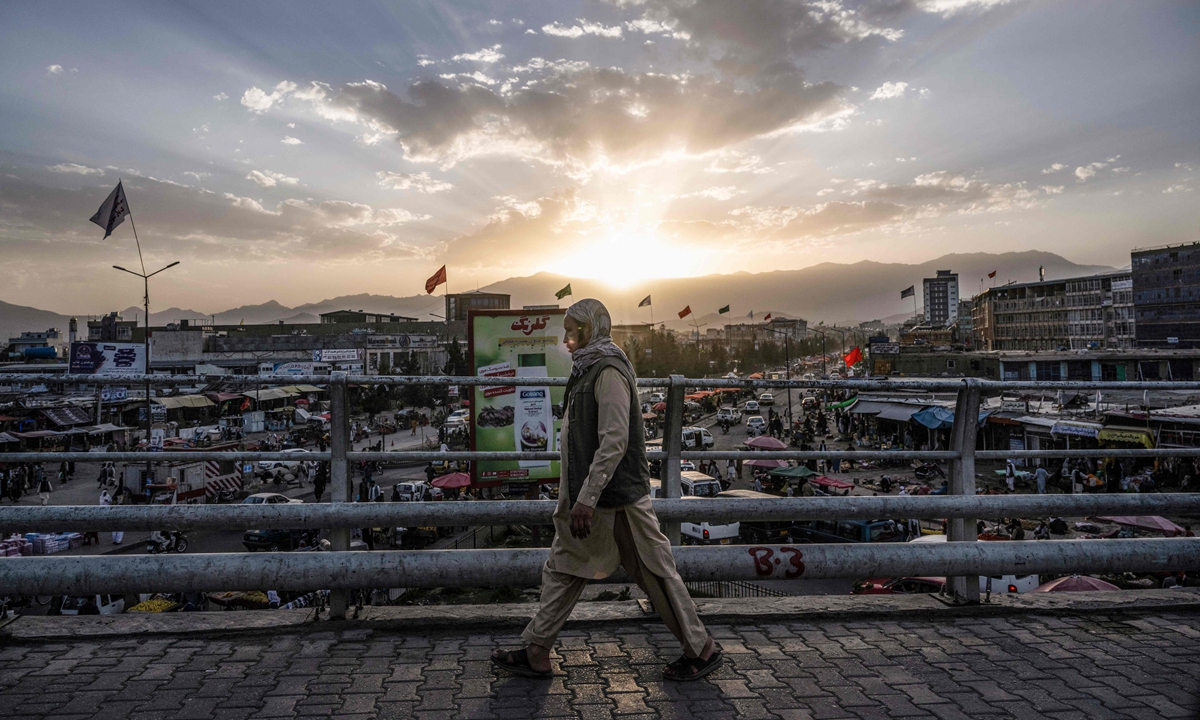Compared with more than 20 years ago when it first took power, the Taliban government is now overseeing a country that has a more complicated social and economic landscape.
Several interviewees pointed out to the Global Times that the Taliban’s administrative capabilities are comparatively more advanced, but the “tribal culture” still holds great sway in their governing style. They said the security situation in the country has improved since Taliban took power.
On the international stage, the Taliban are still seeking diplomatic breakthroughs as, so far, no country has formally acknowledged its legitimacy as Afghanistan’s new government.
As for ordinary Afghan citizens, they noted to the Global Times that they hope the current government will improve the economy and enhance girls’ and women’s rights.
Reduction in violence
Several interviewees in Afghanistan told the Global Times that security in the country has improved over the last year.
Reto Stocker, ICRC’s special adviser in Kabul, told the Global Times that before, rural areas had been cut off because it had been too dangerous and expensive for poor people to travel, while now people in rural areas are able to get access to advanced health services in urban areas.
According to Stocker, some of the ICRC’s local employees who have never been to the villages where their forefathers were born went there for the first time. Some even started going out for picnics for the first time on weekends.
The improvement in security has also allowed Kabul to maintain the basic functioning of urban life.
Yu Minghui, a Chinese businessman engaged in foreign trade in Afghanistan, told the Global Times that his wholesale and retail market in Chinatown has been closed for only one week over the last year since the Taliban entered Kabul but has otherwise operated normally the rest of the time.
Yu has lived in Afghanistan for more than 20 years. “After the Taliban entered Kabul, we were closed for a week. Like everybody else, we were closely watching the Taliban’s attitude toward citizens, the former government, and foreigners,” Yu recalled.
“Four days after they occupied the city, a newly appointed Taliban police chief approached us and told us not to worry and asked if we needed help,” Yu told the Global Times.
The Taliban, Yu said, would “bring their own bread and water to stand guard for us and set up a police post nearby if we needed it. So a week later, we were quickly back to business.”
The Taliban had not harassed Chinatown in the last year, he added. In July, The United Nations Assistance Mission in Afghanistan (UNAMA) released a report titled Human rights in Afghanistan: 15 August 2021 – 15 June 2022. The report showed that there was an overall significant reduction in armed violence. But between mid-August 2021 and mid-June 2022, UNAMA had recorded 2106 civilian casualties (700 killed, 1406 wounded).
“The majority of civilian casualties were attributed to targeted attacks by the armed group self-identified as Islamic State in Iraq and the Levant – Khorasan Province against ethnic and religious minority communities in places where they go to school, worship, and go about their daily lives,” it said.
An AFP report on August 11 pointed out that “a year since returning to power in Afghanistan, the Taliban are a stronger military force than ever, but threats to their rule do exist.” The Panjshir Valley in northeastern Afghanistan is what worries the Taliban the most.
Peter Van Agtmael who has been to Afghanistan many times wrote in the Vanity Fair that “I see convoys of Toyota Hilux pickups packed with Taliban heading on the road toward the Panjshir Valley, where fighting still continues. Even so, the country is mostly at peace, in marked contrast to the tumult and terror of earlier years. My memories of my previous trips are dominated by violence.”
Complicated social, economic challenges
On the economic and social level, Afghanistan under the Taliban’s rule presents a more worrying scene: A shortage of foreign exchange reserves, inflation, increasing poverty, and unemployment.
Afghanistan is believed to be experiencing severe economic difficulties. Reports showed that a large number of Afghan people now face a severe food crisis, and many children are at risk of malnutrition.
Zia, an Afghan journalist based in Kabul, told the Global Times that many people have lost their jobs and he is one of them. His office closed the day the Taliban entered Kabul, meaning he and his colleagues have been unemployed for a year.
He noted that many people are “suffering from poverty in the country. The level of poverty has been increased with the new government. This is a big problem.”
Yu told the Global Times that a severe shortage of foreign exchange reserves in US dollars and the near-collapsing of the banking system were significant causes for the country’s economic problems.
According to Yu, before February, only $200 a week could be withdrawn from a bank account, with the cap being increased to $400 a week from a single account.
“For ordinary people, this amount can meet their basic needs of clothing and food, but the impact on economic activity is huge,” Yu said.
He explained that a bank account that allows a withdraw of only $1,600 a month means it is almost impossible to do business, a situation that now affects almost every company in Afghanistan.
“For example, one of my clients, an Afghan wholesaler, wanted to import milk powder from China. He asked all his relatives and friends to withdraw money together, but it was still not enough and he had to negotiate with us to pay in installments,” Yu said.

Afghan people stand in line to identify themselves before they return home, at a refugee camp in the outskirts of Kabul on July 28, 2022. Photo: VCG
The worsening economic situation has also aggravated the humanitarian crisis. Stocker told the Global Times that they had begun to get calls for help from local medical staff in October 2021 as these rather well-educated professionals had not received their wages for several months and had to walk one or two hours to work. The hospitals also lack funds to allow them to run functionally.
He said the ICRC is giving some medical staffers economic assistance, paying them in cash so as to sustain their work and lives, and to avoid a bigger humanitarian crisis.
The imposing of sanctions on Afghanistan by the US also has worsened the humanitarian crisis. Last week, more than 70 economists and experts, including Nobel Laureate Joseph Stiglitz, called for Washington and other nations to release the Afghan central bank’s assets to allow the economy to function, Reuters reported.
Adapting to modern world
Over the last year, people in and outside of Afghanistan have been observing to what extent the Taliban can adapt to the modern and secular world.
According to Yu, many people do not have modern legal concepts, let alone an understanding of commercial contracts, and still think mainly in tribal culture. This has not only caused a large number of professionals to leave Afghanistan, but has also deterred foreign companies who otherwise wish to invest in Afghanistan.
How the Taliban treats women is also a major focus of global attention.
An Afghan journalist who preferred to be not named told the Global Times that he worries for his daughters who have to remain home rather than attend school. Several interviewees told the Global Times that they are disappointed to see that girls are not allowed to continue with secondary education.
Conversely, for foreign women in Afghanistan, the Taliban has taken a more flexible approach. Yu said that in a recent meeting with an Afghan minister, the Taliban official did not show any resistance to his female Chinese colleague participating in the talks, but declined to take a photo with her after the meeting.
Connect to the world
Stocker has had experiences of engaging with the Taliban for more than 20 years and used to sit with Taliban commanders back in 1990s. He said that compared with 20 years ago, the Taliban’s administrative capabilities have improved.
He said that on the economic level, the 1.0 version of the Taliban government back in 1990s just exported scrap metal from old factories, fruit, and some vegetables, while it would import things like oil, sugar, and tea. But now the Taliban government 2.0 oversees a very complex economic landscape with massive border revenue collection.
In a world that has become more complicated and connected, Stocker thought the new government today “obviously sees what role Afghanistan could play.”
China is now offering a helping hand to Afghanistan that is struggling in the humanitarian crisis to restore its economy. Officials from the Chinese Embassy in Kabul and Chinese state companies have met with Afghan government officials in recent months to discuss Chinese investment and reconstruction projects. In addition, China has provided $8 million worth of assistance to families affected by the recent earthquake in Afghanistan, according to media reports.

Airport workers unload COVID-19 vaccines donated by China at the International Airport in Kabul, Afghanistan, on December 8, 2021. Photo: IC
The Taliban also made some unofficial diplomatic progress. Last month, Uzbekistan convened a meeting on Afghanistan where nearly 30 nations engaged with the Taliban, media reported.
However, the Taliban are far more vigilant when it comes to dealings with foreign businesses and non-government organizations. “As a new government, the Taliban are generally suspicious of most foreign-funded enterprises and institutions … ” Yu said, believing that in international economic cooperation, as well as in their social governance, the Taliban continue to retain a deep “tribal culture” legacy.
To put it simply, the Taliban often recognize only their “brothers,” welcome investments that make them feel comfortable, and contact only foreign companies that they know, he said













